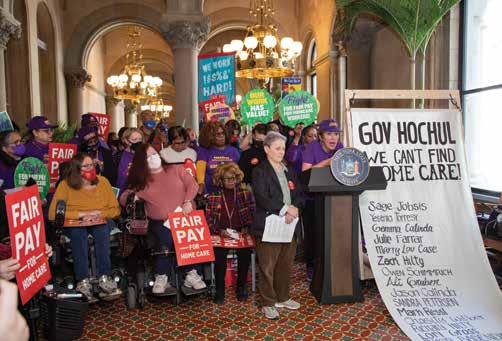Home Care Members Win Permanent Wage Increase
April 19, 2022
Lawmakers in New York hear our demands.

Extra cash was also allocated to give financially insecure safety net hospitals the underpinning they need to look after the state most vulnerable citizens.
For frontline home care members in New York, winning a $3/hr increase over minimum wage will not only have a significant impact on their lives, but it also lays the groundwork for similar political campaigns in other states.
By October 2023, NY home care workers will see their pay increase by more than $500 a month on a 40- hour week.

Home care workers from all over NYS boarded buses to Albany throughout the budget debate to press their case. In most instances, that meant traveling for at least five hours round trip, often in freezing weather.
They joined allies from the disability community and advocates for senior citizens, who understand that reliable home care services depend on fair wages for home care workers.
Taking action to ensure our elected representatives do the right thing for working people has been one of the hallmarks of 1199 since the early days. Back in 1963, a combination of relentless lobbying, expert public relations and strong member unity convinced Nelson Rockefeller, the then Governor of New York to sign a law granting collective bargaining rights to voluntary hospitals in New York City.

“I’m so thankful to hear that legislative leaders took up our cause and the Governor decided to support us,” said Salina Person, Home Health Aide, Rochester, NY, “We work really hard and care a whole lot. We just need to be able to support ourselves so that we can continue this work that is so important.”It is not just their own interests that members were fighting for – but also for the needs of their clients and for those who are not able to access help.

“Right now, there is a shortage of home care workers. Homecare workers are disappearing because they simply cannot afford to do the work. It's a financial challenge for us to pay rent, provide food for our family, and the multiple trains and bus fares just to get to work,” explains Iris Smith, a home care member who works at the Premier agency in Brooklyn. “Home care workers are frontline essential workers,” she adds, “We provide care that makes it possible for seniors and the disabled to maintain their independence, dignity, and respect in their homes in a safe environment where they can thrive.”
1199 Magazine | March / April 2022

